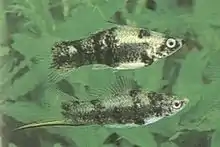Marbled swordtail
The marbled swordtail (Xiphophorus meyeri) is a species of freshwater fish in the family Poeciliidae. It was endemic to the Rio Salado system (itself a part of the Rio Grande basin) in Coahuila, northeastern Mexico.[4][5] It was restricted to springs, connected creeks and pools in waters with a pH slightly above neutral and temperatures of 16–26 °C (61–79 °F), with captive studies indicating that the optimum temperature is around 24 °C (75 °F).[1][5][6]
| Marbled swordtail | |
|---|---|
 | |
| Scientific classification | |
| Domain: | Eukaryota |
| Kingdom: | Animalia |
| Phylum: | Chordata |
| Class: | Actinopterygii |
| Order: | Cyprinodontiformes |
| Family: | Poeciliidae |
| Genus: | Xiphophorus |
| Species: | X. meyeri |
| Binomial name | |
| Xiphophorus meyeri Schartl & Schröder, 1987 | |
| Synonyms[2][3] | |
|
Xiphophorus marmoratus Obregón-Barboza & Contreras-Balderas, 1988 | |
The marbled swordtail is considered extinct in the wild by the IUCN with the last wild record in 1997, meaning that it survives only in captivity.[1] Captive populations are maintained at the Xiphophorus Genetic Stock Center, Texas State University, United States,[1] and by XNP conservation project members, which include public aquariums, universities and private aquarists in several European countries and the United States.[7][8][9] The marbled swordtail shares the title as northernmost naturally distributed Xiphophorus with the closely related Monterrey platyfish (X. couchianus) and northern platyfish (X. gordoni).[5][10] The specific name of this species honours the German ichthyologist Manfred K. Meyer.[11]
References
- Almada-Villela, P.; Contreras-Balderas, S.; Hendrickson, D. (2019). "Xiphophorus meyeri". IUCN Red List of Threatened Species. 2019: e.T23158A2784905. doi:10.2305/IUCN.UK.2019-2.RLTS.T23158A2784905.en. Retrieved 15 November 2021.
- Schartl, Manfred; Schröder, Johannes Horst (1987). "A new species of the genus Xiphophorus Heckel 1848, endemic to northern Coahuila, Mexico (Pisces: Poeciliidae)" (PDF). Senckenbergiana Biologica. 68 (4/6): 311–321.
- Juan Miguel Artigas Azas, ed. (29 November 2012). "Xiphophorus marmoratus Obregón-Barboza & Contreras-Balderas, 1988". The Freshwater Fishes of Mexico. Retrieved 3 July 2023.
- Froese, Rainer; Pauly, Daniel (eds.) (2018). "Xiphophorus meyeri" in FishBase. September 2018 version.
- Ceballos, G.; E.D. Pardo; L.M Estévez; H.E. Pérez, eds. (2016). Los peces dulceacuícolas de México en peligro de extinción. Fondo de Cultura Económic. p. 283. ISBN 978-607-16-4087-1.
- "Northern Platyfish Husbandry Manual". Österreichischen Verband für Vivaristik und Ökologie. Retrieved 17 January 2022.
- "XNP project annual report – year 3". Österreichischen Verband für Vivaristik und Ökologie. Retrieved 17 January 2022.
- "XNP project expanding". Österreichischen Verband für Vivaristik und Ökologie. Retrieved 17 January 2022.
- "Transfer of fish from Würzburg University to Ostrava ZOO". Österreichischen Verband für Vivaristik und Ökologie. Retrieved 17 January 2022.
- Kang, J.H.; M. Schartl; R.B. Walter; A. Meyer (2013). "Comprehensive phylogenetic analysis of all species of swordtails and platies (Pisces: Genus Xiphophorus) uncovers a hybrid origin of a swordtail fish, Xiphophorus monticolus, and demonstrates that the sexually selected sword originated in the ancestral lineage of the genus, but was lost again secondarily". BMC Evolutionary Biology. 13 (25): 25. doi:10.1186/1471-2148-13-25. PMC 3585855. PMID 23360326.
- Christopher Scharpf; Kenneth J. Lazara (26 October 2019). "Order CYPRINODONTIFORMES: Families POECILIIDAE, ANABLEPIDAE, VALENCIIDAE, APHANIIDAE and PROCATOPODIDAE". The ETYFish Project Fish Name Etymology Database. Christopher Scharpf and Kenneth J. Lazara. Retrieved 9 November 2019.
